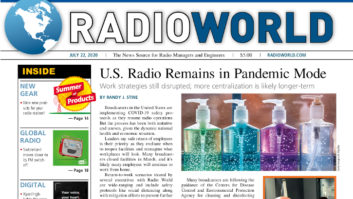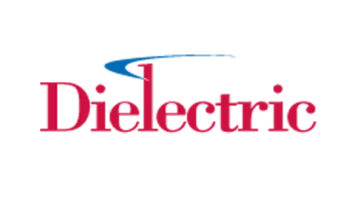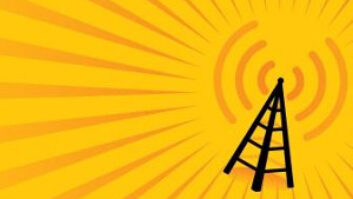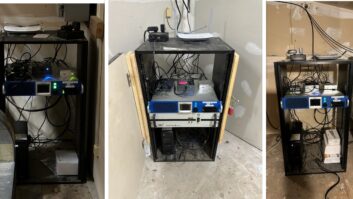GENEVA — Switzerland is embarking on the next phase of its digital radio switchover strategy. In May René Wehrlin, media specialist at Switzerland’s Federal Office of Communications (Ofcom) announced the country’s next steps toward the country’s total transition to DAB+.
Ofcom officially confirmed in 2019 that the nation would say “adios” to all FM radio programs by the end of 2024 at the latest. At the time, the “Digital Migration” (DigiMig) working group, set up by the Swiss private and public radio sectors and Ofcom in 2013, stated that 68% of radio listening was digital, 37% of which was via DAB+ and 15% exclusively via FM.
The Right Moment
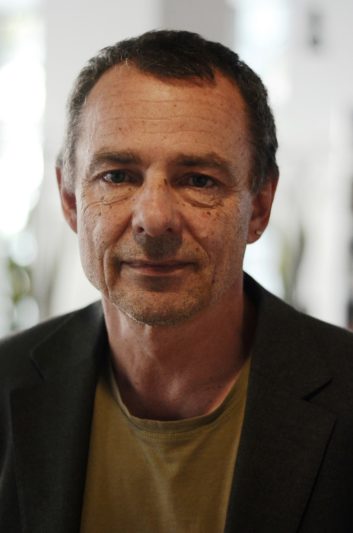
According to Wehrlin, with 10 regional/language-based multiplexes and 15 local multiplexes, a total of 124 stations are now broadcasting via DAB+ in the country. This includes public broadcaster SRG SSR, private broadcasters as well as local and regional broadcasters.
This means DAB+ is now the most used radio reception platform in Switzerland, and Wehrin says the Swiss radio industry is “convinced it’s the right time to prepare for the switch off of FM services.”
[Related: “Broadcast Digital Radio Endures With DAB+”]
Wehrin points to cohesion of the nation’s public and private broadcasters as a major factor in allowing Switzerland to keep pace with its digital switchover plans.
“They are collaborating on the switchover and costs, while competing on content,” he said. “Private radios, public broadcasters and Ofcom have come together in the digital migration through DigiMig to secure a healthy and strong future for the digital future of radio in Switzerland.”
What’s more, Switzerland is diving head first into the digital radio pool. Unlike Norway, which finalized its digital switchover in 2017 but allowed some local stations to remain on FM for five years longer, Switzerland aims to have all stations transitioned to digital by the end of 2024, when FM radio licenses expire.
“It’s possible to switch off FM earlier, but either way we are sure that from 2025 onward — and the radio industry is in absolute agreement on this — there will in all probability no longer be any FM radio in Switzerland,” he said.
Particular Landscape
While Switzerland followed the Norway transition closely, each country in Europe has its own radio landscape and must adjust their individual approach.
“In contrast to Norway, we have four language groups in three parts of the country that must be served equally,” he said. “And we don’t have many large private radio groups. Most private radio stations are not national, but at most have a regional focus.”
That said, he admits the experience of his distant Nordic neighbor provided Switzerland with important insights ahead of its digital switchover.
“For example, we learned that migration would only be successful if all actors — private and public — work toward a common goal,” he said. “This includes all stations switching off their FM services.” He adds that it was also important to learn that DAB+ coverage must be at least equivalent to FM. “For us this also means perfect coverage in highway tunnels. We’ve invested a lot of money in tunnel equipment.”
But of course transitions never come without a few challenges. One area to which Ofcom is paying particular attention remains DAB+ in the car. He says the regulator continues to work closely with the automotive industry to advise existing drivers to install DAB+ in their cars.
Challenges
Today some 96% of new cars sold in Switzerland come equipped with DAB+, but there are still more than 3 million cars on the roads that are not yet compatible with DAB+. This, emphasizes Wehrin, is why it’s important to raise awareness on DAB+ with current drivers.
“With the vast majority of new cars sold in Switzerland now being factory-fitted with DAB+, we have now shifted our attention to the aftermarket sector. Educating the automotive industry and existing drivers on the importance of DAB+ for aftermarket cars is crucial,” he said.
“With this in mind, public broadcaster SRG and our advertising agency have been organizing and running number of automotive workshops, to inform the automotive industry on the opportunities related to DAB+ in aftermarket cars, and offer retail training.”
The campaign, which sports the slogan “More Programs, More Sound, More Radio,” is divided into two phases. The first phase is based on raising awareness and highlighting the benefits of DAB+, as well as preparing the public for the digital switchover. The second phase of the campaign will communicate the official date for the switch off of FM services, and serve as a call to action for the B2B sector.

Wehrin explains that “Dabsy,” the campaign’s official mascot will be the mouthpiece for both stages of the campaign. He adds that marketing efforts based on the digital switchover will also begin one year prior to the switchover.
He stresses that Switzerland’s DSO is the result of an industry decision, not of the authorities. “We have only established the legal basis and assured financial support if the industry wants to take the step.” Also, he says, in order to strengthen media diversity and motivate new players, in recent years Ofcom has subsidized up to 80% of DAB+ transmission costs. “I think this measure has contributed significantly to the success of DAB+ here.”
While the ultimate FM shutoff date is slated for the end of 2024, Wehrin says there are ongoing industry discussions about an even earlier switch off date.
“But this decision has not yet been taken,” he specifies. “Private radio stations will carefully weigh up this decision. They worry they would lose listeners and thus advertising revenue if there isn’t enough DAB+ equipment in circulation at the time of the switch off. And we all need to take this seriously.”






